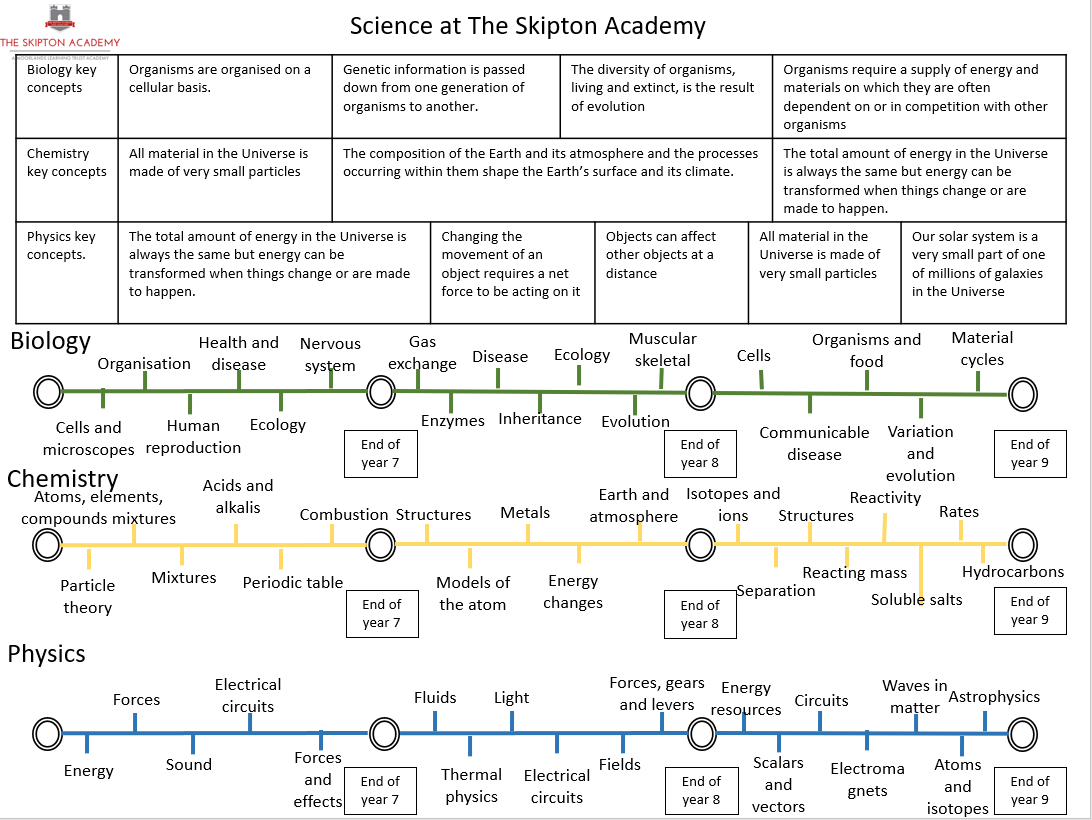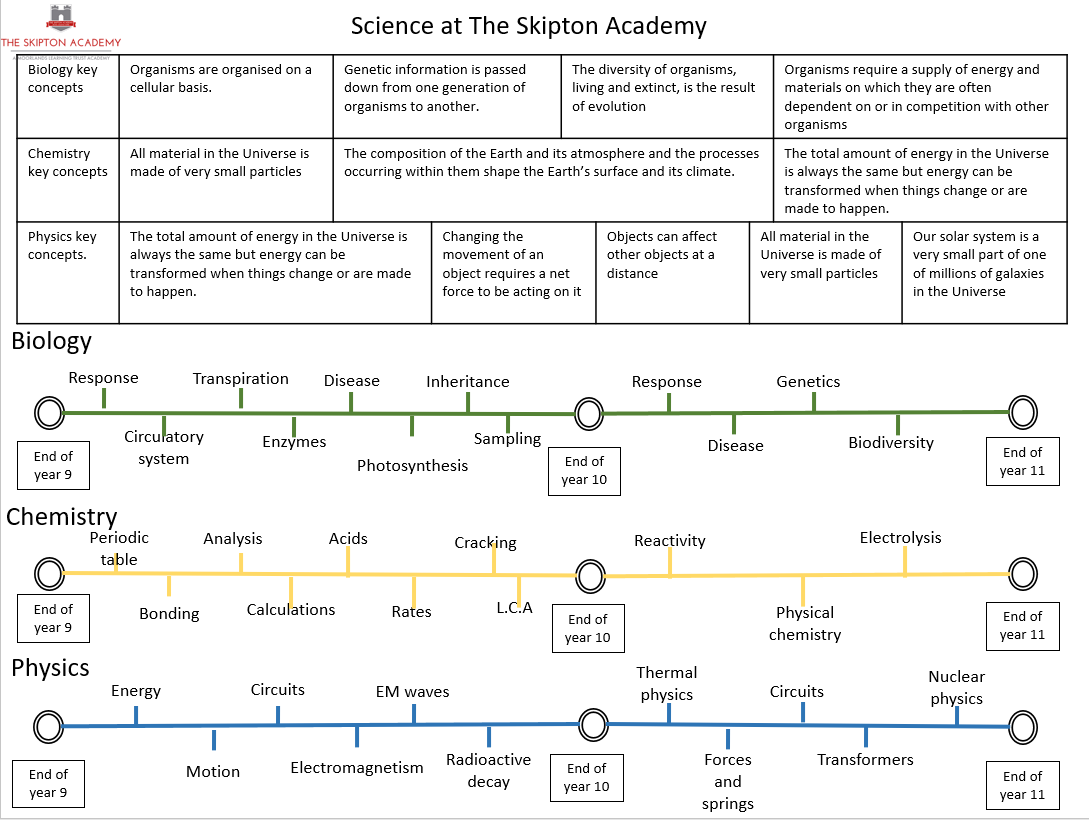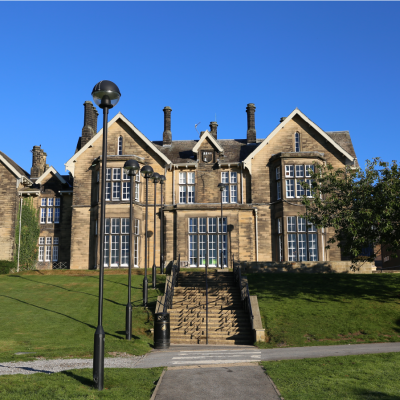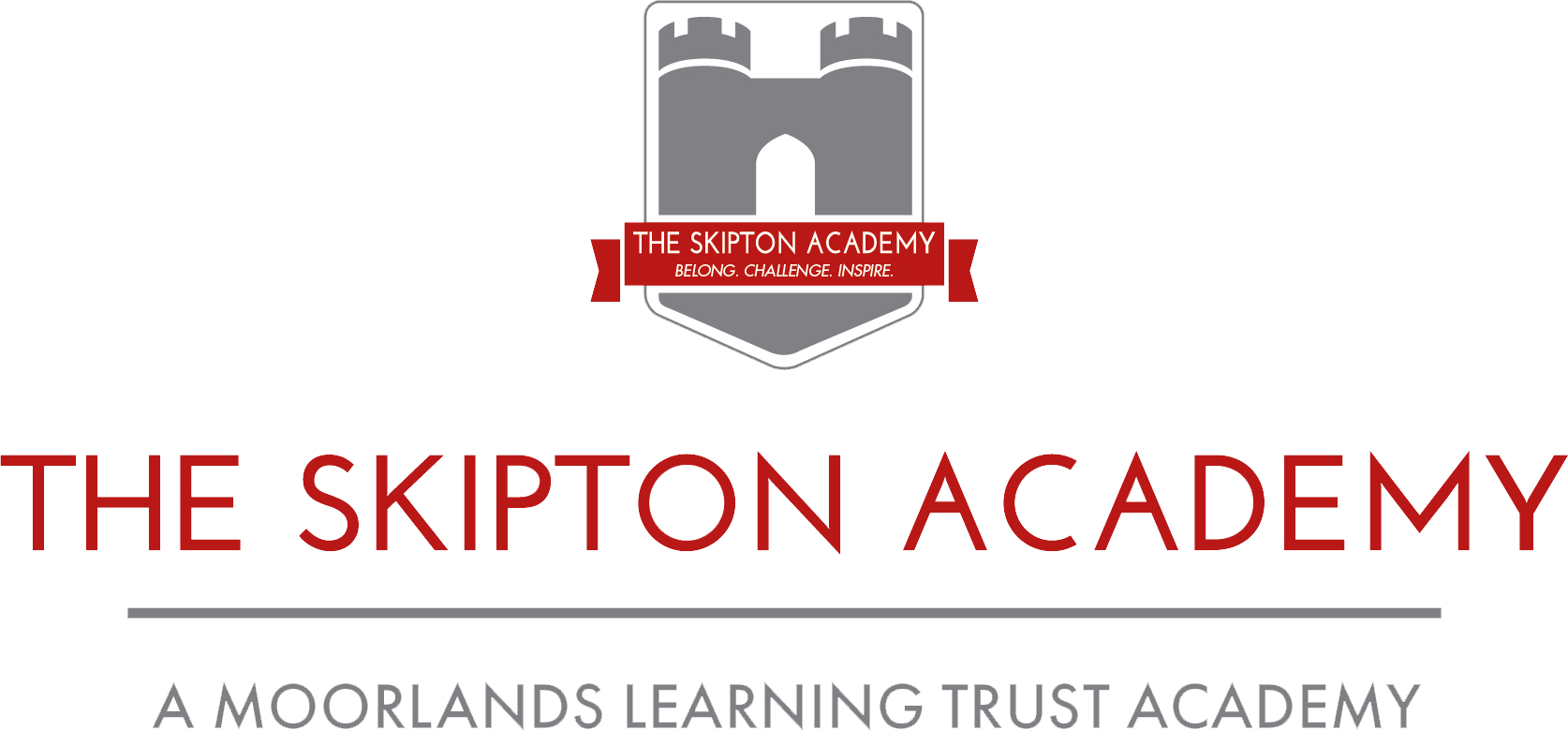Science
The Science Curriculum at The Skipton Academy is designed to provide a science education that teaches the powerful scientific knowledge that will enable every student, regardless of background or starting point, to take an informed part in the decision making that affects their own wellbeing and the wellbeing of society and the environment. It is both inclusive and ambitious taking students outside their lived experience so that they understand the uses and implications of science, today and for the future. It challenges students’ understanding of the ethical and moral decisions that are made on their behalf by scientists and politicians around the world. It aims to inspire students’ curiosity of the world and enable them to recognise the power of rational explanation to explain natural phenomena. By developing metacognitive strategies including planning, carrying out and evaluating practical activities, we aim to develop students’ enjoyment of science through building their self-efficacy. This knowledge can be applied throughout their life in different contexts including that of future science study.
Powerful knowledge: The curriculum is designed to be taught as three subject disciplines of biology, chemistry, and physics through which knowledge about disciplinary and procedural knowledge is woven. It is recognised that there is crossover between these disciplines and the curriculum enables students to form these cross-discipline schema. Students will be supported to develop secure schema through careful sequencing so that they gradually build their knowledge of key concepts including cellular organisation in biology, the atom in chemistry and energy in physics. This will enable students to gain a deep knowledge and understanding of the subject which they can then apply to familiar and unfamiliar contexts. As well as discipline specific vocabulary such as organism, ions, magnitude and bases, the curriculum will also develop knowledge and application of procedural, analytical, and evaluative vocabulary including amongst others the terms hypothesis, validity, reproducibility, and accuracy.
Coherence: In science, students are supported to develop their knowledge and understanding through careful sequencing of the knowledge based on domains within the key concepts moving from more concrete to more abstract ideas. Students will revisit prior learning at regular intervals and build on this to enable them to make more connections and aid memory and mastery. For example, in physics, students will build on the idea of a force as push or a pull by looking at contact and non-contact forces and expanding their vocabulary to describe gravitational forces in terms of attraction and the concept of weight. They will then study the effects of gravity, thrust, air resistance, water resistance and friction, when forces are balanced and unbalanced, and move to being able to calculate the resultant force. This leads to the study of Newton’s Laws of motion and the application of these ideas to unfamiliar contexts.
The Progress Model: Students will be supported to “know more and remember more” about the three subject disciplines and cross disciplinary and procedural knowledge through the carefully sequenced curriculum. For each domain within the key concept, there are a clear set of end points for each year group which are both inclusive and ambitious for all students regardless of starting point. This will enable students to gain mastery within their key stage, applying their knowledge to both familiar and unfamiliar contexts, empowering them to achieve academic success to progress to their chosen next step. For example, in chemistry students will build on their KS2 knowledge of the properties of materials by studying the particle model of matter which will enable them to explain these observations at a micro level. They will study how solids, liquids and gases can be further categorised as ionic, simple molecular, giant covalent compounds and metals. Then through their knowledge of the atom they will be able to explain these properties in terms of bonding. This will provide students with the knowledge to study A Level chemistry, BTEC sciences, Applied general science or any apprentiships for example as science technicians, if this is their chosen path.
How students learn: The curriculum is implemented by embracing the role of cognitive science to aid durable learning. The curriculum is designed to revisit and practise for memory, ensuring there is opportunity for spaced practice and retrieval practice. Pedagogical strategies such as modelling and scaffolding using expert explanations are embedded to ensure students understand the learning process and ultimately become self-regulated and metacognitive learners. For example the curriculum is chunked into manageable groups of knowledge which are frequently revisited and built on so students will have many opportunities throughout the 5 years to memorise the cell as a key concept for living organisms in terms of both unicellular and multicellular organisms.
Key stage 3
Biology
Cells and microscopes
Organs and organ systems
Human reproduction
Disease and health
Ecology
The nervous system
Gas exchange and diffusion
Enzymes and digestion
Communicable disease
DNA and inheritance
Ecology and evolution
Muscular skeletal system
Chemistry
Particle theory
Atoms, elements, compounds and mixtures
Mixtures and separation techniques
The Periodic Table
Acids and alkalis
Earth’s resources, crude oil and combustion.
Rock cycle
Introduction to structure
Nuclear model of the atom
Reactions of metals
Energy changes in reactions
Earth and the atmosphere
Physics
Energy
Forces
Sound
Electrical circuits
Forces and their effects
Fluids
Thermal physics
Light and waves
Energy changes
Fields and astrophysics
Forces, gears and moments.
Working scientifically
This will be incorporated into the teaching of the three disciplines following the domains of: scientific thinking, experimental knowledge, use of apparatus and techniques, recording observations, analysis and evaluation, communicating science.
Key stage 4
Key concepts continue from KS3:
Biology
Cells and organisation
Health and disease
Bioenergetics
Inheritance, variation and evolution
Ecology
Chemistry
Atoms and the periodic table
The properties of matter
Quantitative chemistry
Chemical changes
Energetics, rates and equilibria
Organic chemistry
Earth Science
Physics
Energy and thermal physics
Particles and nuclear physics
Mechanics and materials
Fields
Electricity
Waves
Astrophysics
Working Scientifically
Development of scientific thinking
Experimental knowledge
Recording observations
Analysis and evaluation
Communicating scientifically
KS3 Science Learning Journey

KS4 Science Learning Journey













